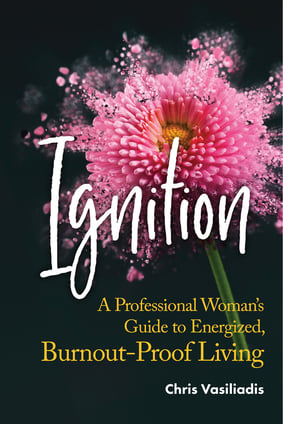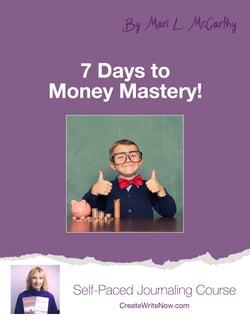I’ve kept a journal since my childhood years, starting in 1980. At this writing, that makes four decades. In those early days, it was called keeping a diary. I can recall owning some diaries that even had an inexpensive lock across the binding.
I don’t journal for posterity or to capture a historical record. My husband and I don’t have children, and I’m pretty sure my nieces and nephews wouldn’t be interested in my thoughts. I write for my stability and my sanity. Journaling for me is a life-giving and renewing adventure – I see it as another source of oxygen. It’s a refuge for me to tap into that enables the best and fullest of me to come forth.
Do I journal every day? No, but I journal most days. And the days that I journal unfold significantly better than the ones where I don’t.
I previously kept and stored all my journals since the beginning (in boxes in the basement or attic), until my husband and I moved in 2007. That was when I decided to throw out all my prior journals. You might have read that sentence, and had to either re-read it again, or gulped in horror. Yes, I threw out my journals from 1980 – 2007. Again, for me, I rarely go back and review what I previously wrote. In hindsight, I feel that decision, in part, was a means to metaphorically release years of baggage I formerly carried. Over the years, I’ve found how I best benefit from journaling is in the processing of what’s happening now, or thoughts I have about what’s occurred or what I anticipate. Emptying out my mind. Overall, it helps to reground me into the present.
I use my favorite pen: a Uni-ball retractable gel pen, medium (.7 mm) point, black ink, which I buy by the dozen. I write in a variety of different types of journals – whatever catches my eye in a local bookstore or stationery shop – never a notebook (unless I forget to bring my journal on vacation and a notebook is all I have with me). Each time I buy my next journal, I’m like a giddy kid at Christmas – it always brings me a jolt of joy. Paper quality is important to me – and lined paper at that. Something that feels good in my hands, is a pleasure to write in, and looks pleasing to me. These days, my journaling spot is predominantly sitting at the right end of my living room couch.
Journaling is generally the first activity I do in the morning upon waking. My journaling technique is primarily stream of consciousness, following the guidance of Julia Cameron in writing what she describes as “morning pages.” Basically, first thing in the morning, your write to fill up 3 pages: a brain dump of sorts. Some days the words gush out as if from a firehose, other days it’s a slow trickle.
I’ll also use journaling to develop material in my line of work as a health coach, speaker and author. Journaling has helped me create newsletter articles, workshop material, and chapters in my book. It’s helped me brainstorm through challenging client circumstances and has been a place of reflection both during and after a client engagement. I’ve used it to think through upcoming conversations and meetings, helping me to visualize how I want to be in a specific situation.
Sometimes I’ll also include prompts that I either get from whatever I’m reading or listening to (from books, to interviews, to trainings or inspirational teachings), from an intuitive hit during a conversation, to an Oracle card I pulled. At times, I’ll even write out a question to Spirit/Universe, some Higher Power, guardian angel or deceased soul, and then be still and document the answers I receive.
Given how long I’ve been journaling, when I reflect on my experiences with it, the following highlights come up for me.
- Journaling has been like a close friend of mine. While yes, writing first thing in the morning is my standard practice, if I wake up in the middle of the night and have trouble falling asleep, one of my “go to” techniques is grabbing my journal and brain dumping what’s in my head. It’s something I can “call on” at any time of the day or night, when I need a sounding board or to hash things out.
- Journaling has helped me see how I’m relating to myself and others, to various situations, and where I might be getting in my own way. By walking through current circumstances and my thoughts about them, it gives me a vehicle to examine my perceptions, and opens the door to possibly choose another angle.
- I’ve used journaling at both the micro and macro level. At a micro level, I may use it to think through how I’m going to approach the day ahead of me, and the tasks I want to complete. I may use it to role play a conversation I intend to have with my husband, or a client, friend or business associate. When I was writing my book, Ignition, I would think through different chapters and sections of the book and to help prioritize what needed to be done next.
At a macro level, it’s been essential in traversing and experiencing a variety of life events, from celebratory to challenging times, and even tragedies, including:
- relationship, friendship and professional break-ups
– meeting my husband. One of my most noteworthy memories after coming home from our first date is that I wrote in my journal: “I just met the man I’m going to marry.” We got married a little over 3 years later.
- the murder of a childhood friend
- deciding whether and when to move (my husband and have lived in 4 different places in our almost 25 years of marriage)
- coming to terms with being diagnosed with multiple sclerosis and how, when and with whom to share that information
– my father-in-law’s accident that rendered him paralyzed and his subsequent death 10 months later
- my father’s cancer diagnosis and death less than 3 years later
- my husband’s accident with a table saw where he lost 2 ½ fingers and 2/3 of his thumb
- processing a myriad of career changes and pivots
Also, at a macro level, journaling has shaped me deeply. It’s helped me think through who I want to be and how I want to show up in a variety of situations: whether those circumstances are positive, negative or neutral. During the various twists and turns in my personal and professional life, journaling has been my refuge, my place to tap into, to both restore myself and remember who I am. It’s been a way to peel back layers of emotions, feelings and thoughts and get to the crux of a matter. It humbles me in revitalizing my resourcefulness, and the recognizing the strengths from which I can pull.
Whether micro or macro level, it’s been a vehicle for getting clear on my whys whats and hows. However one goes about it, I’ve discovered there’s no single correct way to journal. You can’t mess this up.
For me, it’s such an ingrained part of my life – I can’t not journal. It pulls me in. It calls to me. It’s something that’s always there, that I can rely on and fall back on.
I consider myself an extrovert (for those familiar with Myers-Briggs types, I’m ESTJ), but there’s an introvert aspect to me as well. I love social in person interaction, but I also gain energy from silence and regrouping at home and within. There’s a solace to my journaling. It brings me peace.
Years ago, I let go of writing daily. There might be times I don’t write because it feels too tender and painful to examine what’s going on, externally or internally. When I work up the courage to face the page, I’ve learned to be profoundly compassionate with myself at those times and come back to journaling when I’m ready to acknowledge my vulnerabilities and admit what I don’t know. Other times that I’ve set journaling aside, it’s because I’ve allowed the frenzy of life to take over instead of remembering that I can always control the pace at which I operate. Every time I come back to journaling grants me that pause of reflection and a vital reset.
Journaling pairs quite well with my meditation practice. I’ll often meditate immediately after journaling. I feel the brain dump helps me bring a clearer presence and deeper intention to my meditation. Journalizing often releases my grip on certain things, causing a clearing of the deck, so to speak, before meditating. It provides a doorway for my highest self to enter.
Ultimately, journaling helps me put out the welcome mat for whatever is percolating within. It’s a non-judgmental friend that’s always there. I cannot imagine a time in my life where journaling ceases to be a part of my routine. I’ll always have a pen and the next blank journal on hand.

Author bio: Chris Vasiliadis is a National Board Certified Health & Wellness Coach who inspires people to use their well-being as their secret weapon to successfully lead their life. After a multiple sclerosis (MS) diagnosis out of nowhere prompted Chris to refocus on her health, she became passionate about helping others create their ideal state of health and wellness. This led her to becoming trained and certified as a health coach, and launching her business, Priority Wellness, in 2008. Since then, working one-on-one, with groups and speaking in professional, healthcare, academic and corporate settings, she has helped countless individuals live in conscious ways that enhance their health. Chris is also the author of the book Ignition: A Professional Woman’s Guide to Energized, Burnout-Proof Living. She has been relapse-free from MS for over 13 years.
NOW ON SALE!



Leave Comment